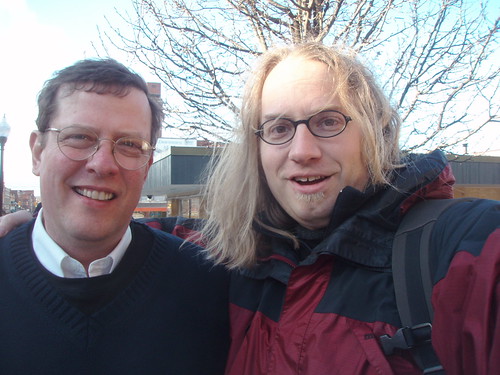Late last week, I received a letter in the mail from Morgantown's City Office Manager, Terrence Moore, announcing some incredible news. Morgantown has
launched a full scale curbside recycling program. This is outstanding news and
a big leap forward for our community’s efforts to take better care of the
planet.
Why am I so excited about this? For a long time, recycling
has been something I have cared about (to varying degrees). When I was a kid, I
used to walk along river banks and through neighborhoods to pick up aluminum
cans. Part of this was good for the environment, and part of it was good for me
to have some money for baseball cards and things like that. When I was a freshman
at WVU, I worked hard to get a recycling program initiated in the residence
halls. It had some fits and starts during my undergraduate era, but now, I’m
excited to say that the university has an incredible focus on recycling and
sustainability efforts.
Separately, in 2006, I found out my mom had breast cancer.
She went to be with Jesus about a year later. Incidence of cancer has risen drastically over the
last 20-30 years. My wife’s mom was diagnosed with breast cancer last year
while we were on our honeymoon. Three of my dad’s living siblings have had
cancer. My sister has had cancer. I’m sure you can think of folks who are close to
you as well. In my reading, one of the leading contributors to cancer is
believed to be environmental issues. When I made that discovery, I began to
look really closely at my own energy consumption habits as well as the amount
of waste I was producing.
At the time I lived with roommates, and we had gatherings at
our house on a regular basis. We produced a lot of materials that went in the garbage.
We started recycling back then. It would take 2-3 weeks to fill our garbage can
after we started recycling. It occurred to me as I made trips to the local
recycling center that my roommates and I could reduce the speed at which
landfills would fill by choosing to recycle. From everything I’ve read, it
takes significantly energy to recycle some materials than it does to produce
new materials. Some materials take a really long time to begin to break down,
and those same materials can be recycled fairly easily.
Now, my wife and I continue to recycle. As a result, we fill
an eight-gallon trash bag with non-recyclable material about one or two times
per month. Our recyclables require us to
fill our car once per month to take it to the recycling center.
All that being said, the biggest reason I’m excited about
this recycling program is that it appears to be really easy. During the week of
December 10, 2012, residents will receive a 65 gallon recycling cart. Service
will start the week of January 7, 2013.
The program will recycle just about everything. Aluminum
cans, all colors and shapes of glass, corrugated cardboard, newsprint and
inserts, steel cans, plastics #1-6, paperback books/phone books, magazines,
catalogs, junk mail, office paper, pizza box lids, and even dry food and tissue
boxes.





So it's been over a week, and I haven't shared with anyone the top three dr. sleeth shared with us during the week of Another World Is Possible.
He was asked the top three things he thought people could do to be better stewards of God's creation. And here were his three responses.
1) Keep the Sabbath. He wasn't focusing in on a particular day; he was simply stating that as a culture we have forgotten how to rest. We are always going, going, going. In fact, he said it was one of his biggest personal challenges as he traveled from place to place speaking about the environment. He has been consistent to take a sabbath, but sometimes it is difficult to make it the same day each week. The key is to make sure you do it. I've blogged about it recently, you can read that blog entry here.
2) Cut consumption and waste production by 10% and give the money saved to Kingdom work. This could be as simple as turning off lights in your house when you aren't in a room. Or, maybe you could turn your thermostat down 2-3 degrees. It's kind of funny because many people want to run their thermostats at 70+ degrees in the winter, and for most of our human existence, we dwelt in homes that were significantly colder in the winter. Another thing you can do is eat out less, or buy locally grown food, or even share a meal with someone. Most of our restaurant portions are large enough for two people. As far as Kingdom work is concerned, there are a number of great organizations out there, and a few of them were part of our week of events at wvu.
3) Find a group of people to do these things with. Could you imagine what the effect would be if you and your small group, or some folks in your church began to cut back and observe a sabbath. Imagine how it would affect your interactions with one another. Imagine what you could do if 10 people cut their consumption by 10%. Just look at my group on the one billion bulbs website. Only 18 people have signed in as my friends and we have saved over $2000 simply by switching our bulbs for compact fluorescent bulbs. You should consider switching and joining.
I think Dr. Sleeth's top three ideas are wonderful for a number of reasons. 1) They are doable. There isn't a single person I know who couldn't observe the sabbath, cut their consumption habits, and even find people to do that with. 2) They are able to be adapted by area. People in FL typically don't need to worry about cutting a gas bill for instance, but folks in WV do. People in FL, could cut down electrical use though. 3) He emphasizes community. We aren't meant to be alone in our endeavors, and it is helpful to be encouraged along the way by entering into a practice with others.
Will you make a commitment to these ecological three? Take the time to leave a comment and share what you are doing to work toward better environmental stewardship--maybe your idea can spark others.